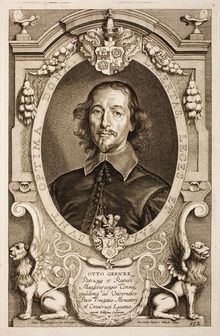Von Guericke
| Otto von Guericke | |
|---|---|

Otto von Guericke, engraving after a portrait by Anselm van Hulle (1601–1674)
|
|
| Born | November 30, 1602 Magdeburg, Holy Roman Empire |
| Died | May 21, 1686 Hamburg, Holy Roman Empire |
| Nationality | German |
| Fields | Physicist, politician |
| Known for | Research and experiment for vacuums |
| Influenced | Robert Boyle |
Otto von Guericke (originally spelled Gericke, German: [ˈɡeːʁɪkə]; November 20, 1602 – May 11, 1686 (Julian calendar); November 30, 1602 – May 21, 1686 (Gregorian calendar)) was a German scientist, inventor, and politician. His major scientific achievements were the establishment of the physics of vacuums, the discovery of an experimental method for clearly demonstrating electrostatic repulsion, and his advocacy of the reality of "action at a distance" and of "absolute space".
Otto von Guericke was born to a patrician family of Magdeburg. In 1617 he became a student at the Leipzig University. Owing to the outbreak of the Thirty Years War his studies at Leipzig were disrupted and subsequently he studied at the Academia Julia in Helmstedt and the universities of Jena and Leyden. At the last of these he attended courses on mathematics, physics and fortification engineering. His education was completed by a nine-month-long trip to France and England. On his return to Magdeburg in 1626 he married Margarethe Alemann and became a member of the Rats Collegium of Magdeburg. He was to remain a member of this body until old age.
Von Guericke was personally distrustful of the city's enthusiasm for the cause of Gustavus Adolphus but was nonetheless a victim of the fall of Magdeburg to von Tilly's troops in May 1631. Destitute, but fortunate to escape with his life, he was an Imperial prisoner at a camp in Fermersleben until, through the good offices of Ludwig of Anhalt-Cothen, a ransom of three hundred thalers had been paid. Following a period of employment as engineer in the service of Gustavus Adolphus he and his family returned to Magdeburg in February 1632. For the next decade he was occupied rebuilding his own and the city's fortunes from the ruins of the fire of 1631. Under the Swedish and subsequently Saxon authorities he remained involved in the civic affairs of the city, becoming in 1641 a Kammerer and in 1646 Burgomaster, a position he was to hold for thirty years. His first diplomatic mission on behalf of the city, in September 1642, was to the court of the Elector of Saxony at Dresden to seek some mitigation of the harshness with which the Saxon military commander treated Magdeburg. Diplomatic missions, often dangerous as well as tedious, occupied much of his time for the next twenty years. A private scientific life, of which much remains unclear, was developing in parallel.
...
Wikipedia
